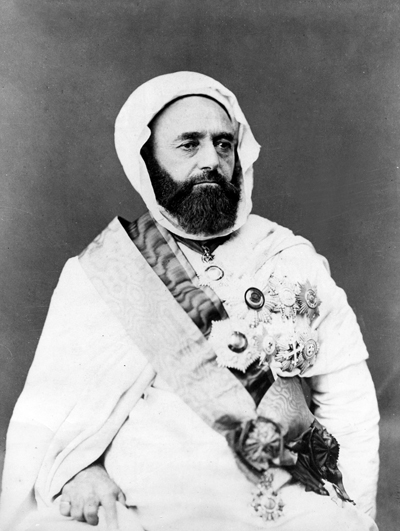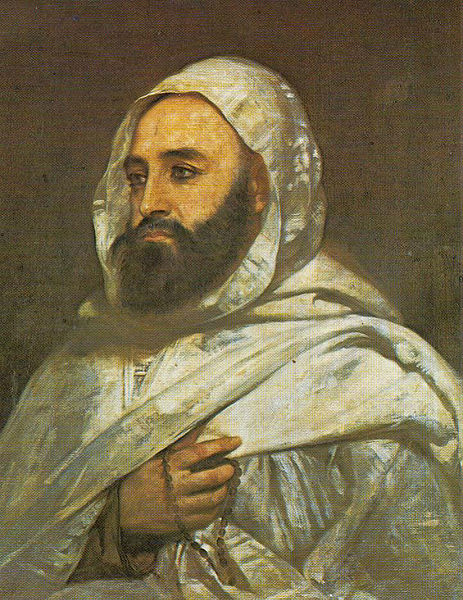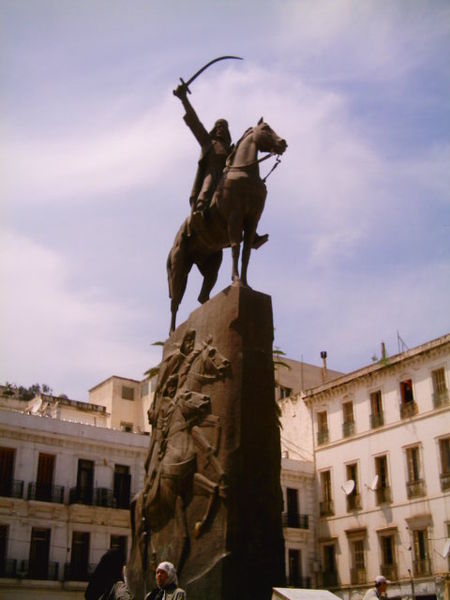<Back to Index>
- Philosopher Moses Mendelssohn, 1729
- Sculptor Horatio Greenough, 1805
- Algerian Political and Military Leader Abd al-Qadir al-Jaza'iri, 1808
PAGE SPONSOR



`Abd al-Qādir Bin Muhieddine (6 September 1808, near Mascara - 26 May 1883, Damascus), (in Arabic عبد القادر ابن محي الدين) known as Emir "Prince" Abd al-Qādir or Abd al-Qādir al-Jazā'irī, was an Algerian Islamic scholar, Sufi, political and military leader who led a struggle against the French invasion in the mid nineteenth century, for which he is seen by the Algerians as their national hero.
`Abd al-Qādir is often referred to only as `El Amir Abdelkader, since al-Jazā'iri simply means "the Algerian". His name can be variously transliterated from its Arabic spelling as Abd al-Kadir, Abdel Kader, Abdelkader, and other variant spellings. He is also often given the titles amir, prince, and shaykh or sheik.
`Abd
al-Qādir was born near the town of Mascara near Oran, in
1807 or 1808. His father, Muhyi al-Din
al-Hasani, was a shaykh in the Qadiri sufi order of Islam.
He was a Banu
Ifran Berber and claimed descendance from Muhammad.
In his childhood he memorized the Qur'an and was trained in
horsemanship, theology and
linguistics, and received an education far better than that of his
peers. In 1825, he set out for the Muslim pilgrimage, hajj,
with his father. While in Mecca,
he encountered Imam Shamil;
the two spoke at length on different topics. He also traveled to Damascus and Baghdad,
and visited the graves of noted Muslims, such as Shaykh Ibn Arabi and Sidi
Abd-el-Kader El Jilani named
also El-Jilali in Algeria. This experience cemented his religious
enthusiasm. On his way back to Algeria,
he was impressed by the reforms carried out by Muhammad `Ali in Egypt. He returned to his homeland a
few months before the arrival of the French. In 1830,
Algeria was invaded by
France; French colonial domination over Algeria
supplanted what had been domination in name only by the Ottoman Empire.
Within two years, `Abd al-Qādir was made an amir and with the loyalty of a
number of tribes began a rebellion against the French. He was
effective at using guerrilla
warfare and
for a decade, up until 1842, scored many victories. He often signed
tactical truces with the French, but these did not last. His power base
was in the western part of Algeria, where he was successful in uniting
the tribes against the French. He was noted for his chivalry;
on one occasion he released his French captives simply
because he had insufficient food to feed them. Throughout this period
`Abd al-Qādir demonstrated political and military leadership, and acted
as a capable administrator and a persuasive orator. His fervent faith
in the doctrines of Islam was unquestioned, and his ultimate failure
was due in considerable measure to the refusal of the Kabyles, Berber mountain tribes, to make
common cause with the Arabs against the French. Until the
beginning of 1842 the struggle went in his favor; however, the
resistance was put down by Marshal Bugeaud.
In 1837, `Abd al-Qādir signed the Treaty of Tafna with
Bugeaud, in which he recognized France's sovereignty in Oran and
Algiers, while France recognized his control over the remaining
two-thirds of the country, mainly the interior. When French troops
marched through a mountain pass in territory `Abd al-Qādir claimed as
his in open defiance of that claim, he renewed the resistance on
October 15, 1839. `Abd
Al-Qādir was ultimately forced to surrender. The French armies grew large, and brutally
suppressed the native population and practiced a scorched-earth policy. `Abd Al-Qādir's
failure to get support from eastern tribes, apart from the Berbers of western Kabylie,
also contributed to the quelling of the rebellion. On December 21,
1847, after being denied refuge in Morocco (strangely parallelling Jugurtha's
career
two thousand years earlier) because of French diplomatic and
military pressure on its leaders, `Abd al-Qādir surrendered to General Louis de
Lamoricière in
exchange for the promise that he would be allowed to go to Alexandria or Acre.
Two days later, his surrender was made official to the French Governor-General
of Algeria, Henri
d'Orléans, duc d'Aumale. The French government refused to
honour Lamoricière's promise and `Abd Al-Qādir was exiled to
France. Al-Qādir
and his family were detained in France, first at Toulon,
then at Pau, and
in November 1848 they were transferred to the château
of Amboise. There he remained until October 1852, when he was
released by Napoléon
III and given an
annual pension of 100 000 francs on taking an oath never
again to disturb Algeria. He then took up residence in Bursa,
moving in 1855 to Damascus.
He
devoted himself anew to theology and philosophy, and composed a
philosophical treatise, of which a French translation was published in
1858 under the title of Rappel
à l'intelligent. Avis à l'indifférent. He also
wrote a book on the Arabian horse. While in
Damascus he befriended Jane Digby and Richard and Isabel Burton.
In July 1860, conflict
between the Druze and Maronites of Mount Lebanon spread to Damascus, and
local Druze attacked the Christian quarter,
killing over 3,000 persons. `Abd al-Qādir and his personal guard saved
large numbers of Christians, bringing them to safety in his house and
in the citadel.
For this action the French government increased his
pension to 4000 Louis and bestowed on him the Grand Cross of
the Légion d'honneur. He was also honoured by Abraham Lincoln for this gesture towards
Christians with several guns that are now on display in the Algiers
museum. In 1865 he visited Paris on the invitation of Napoléon
III and was
greeted with both official and popular respect. `Abd
Al-Qādir died at Damascus on 26 May 1883 and was buried near the great sufi Ibn Arabi in Damascus. Abd
al-Qādir is recognized and venerated as the first hero of Algerian
independence. However, there is some controversy around his devotion to
his people after his capture. A letter he wrote to Napoleon reveals his
loyalty to the French leader. Not
without cause, his green and white standard was adopted by the Algerian
liberation movement during the War of
Independence and
became the national flag of independent Algeria. He was buried in
Damascus in the same mausoleum as Ibn Arabi,
until
the Algerian government brought his remains back to Algeria to be
interred with much ceremony on 5 July 1966, the fourth anniversary of
independence and the 136th anniversary of the French conquest. The Emir Abdel
Kader University and
a mosque bearing his name were constructed as a national shrine in
Constantine, Algeria. An
indication of the international fame of al-Qādir's struggle is given by
the way that the town of Elkader, Iowa, in the United States came to be named after him.
When the new community was being officially planned, on what was then
the American frontier,
founders Timothy Davis, John Thompson and Chester Sage — none of them
Arabs or Muslims — were so impressed with what they heard of the
Algerian
leader's valiant struggle that they decided to name the new town for
him. The American town has retained its Algerian connection by
establishing a sister city connection with Mascara, Algeria. His
notable children and grandchildren: